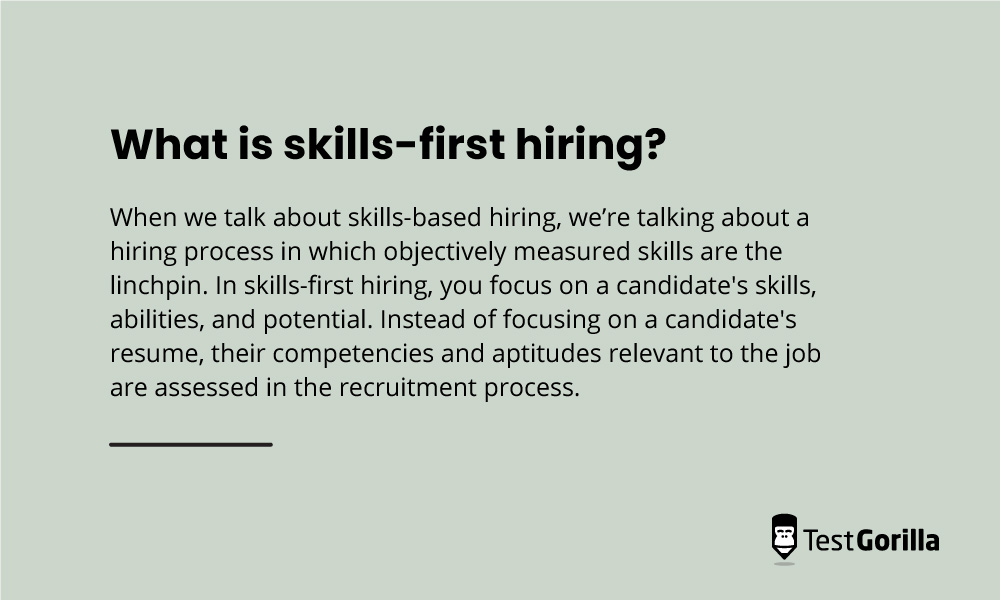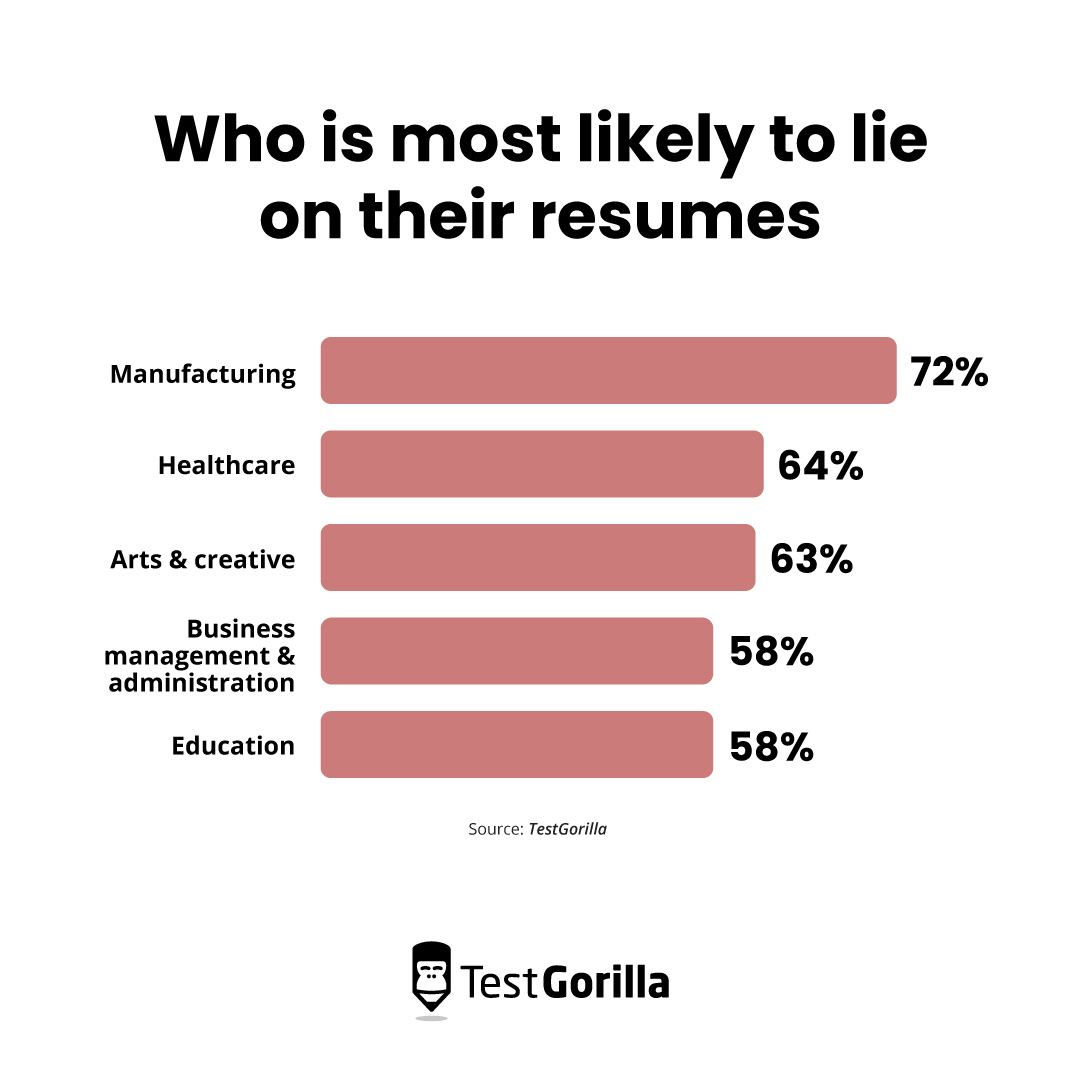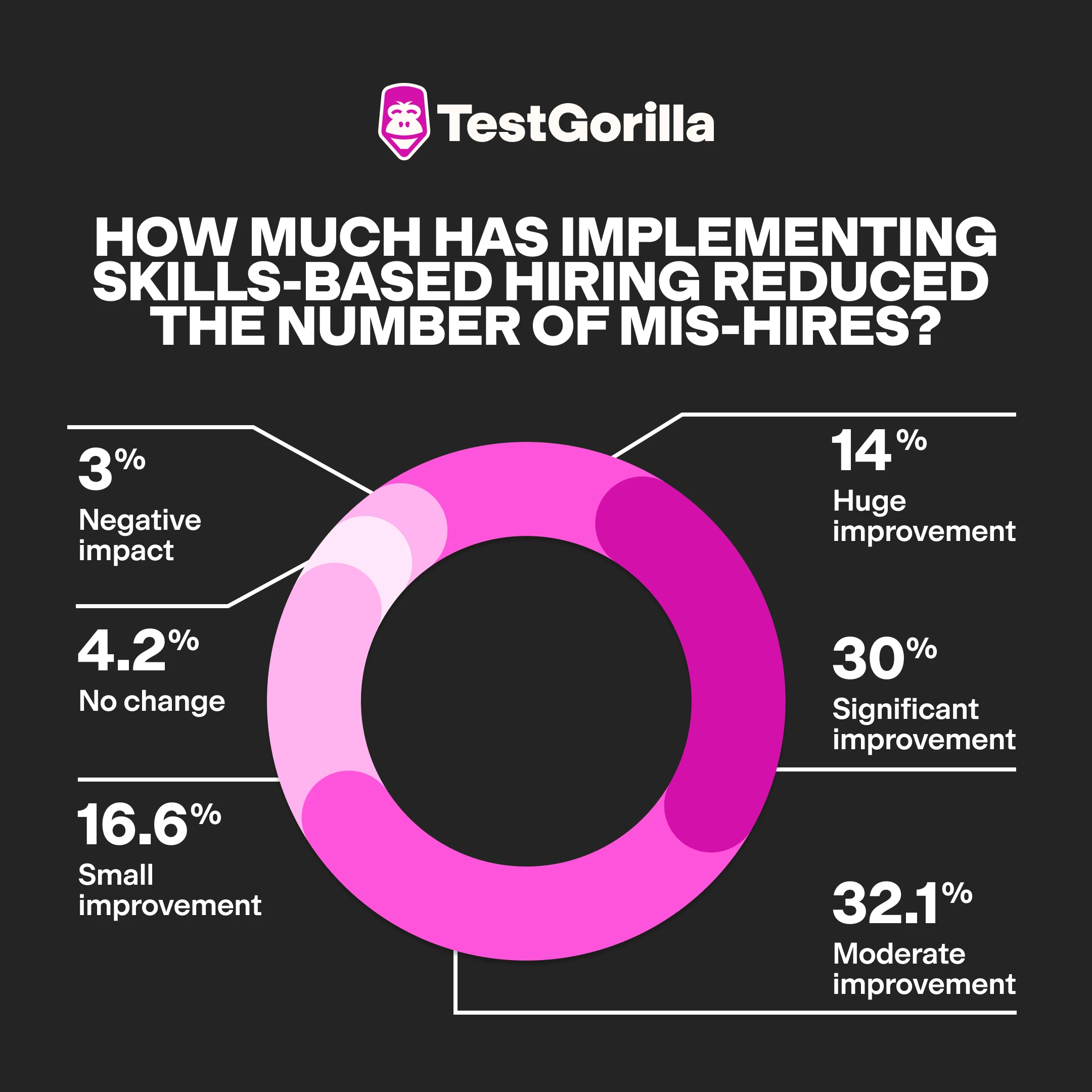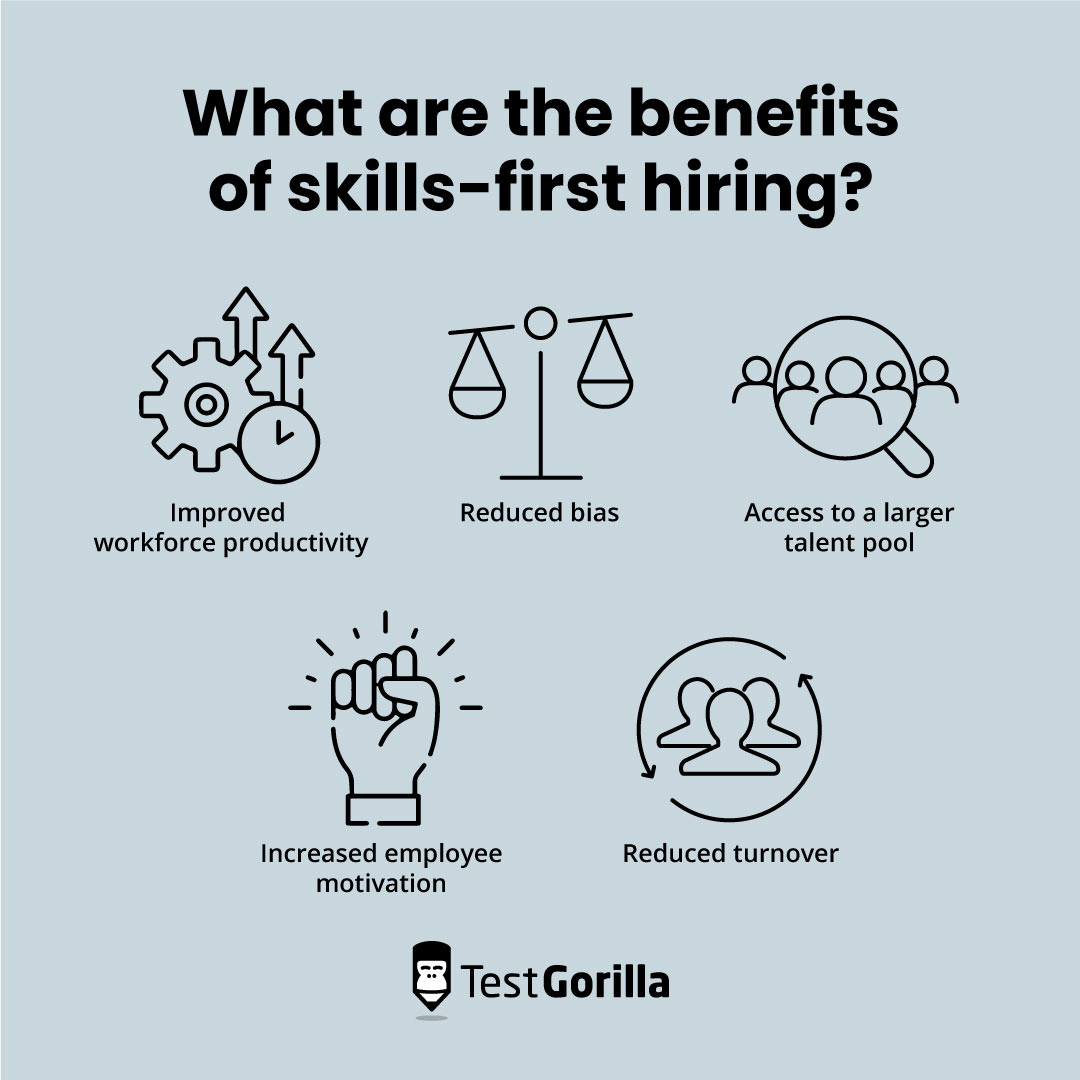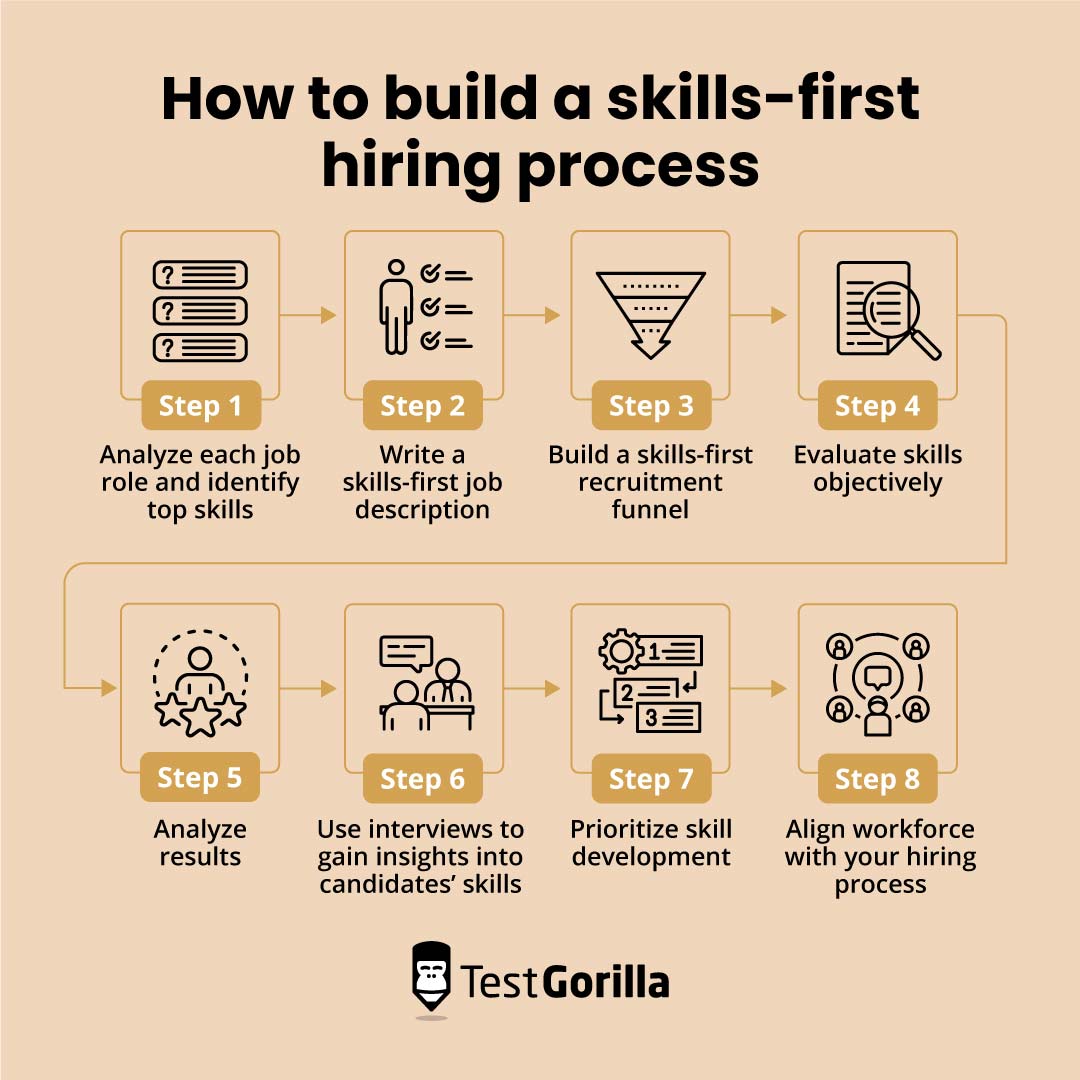Ask any recruiter about the importance of skills and they would say it’s one of (if not the most) important factors when selecting a candidate. However, in traditional hiring, skills assessments come a lot later in the process than resume screening.
And indeed, for decades, candidate selection has been synonymous with resume screening. Evaluating resumes and looking at degrees, job titles, and years of experience have been the cornerstones of the selection process. However, if that’s your way of doing things, you’re probably eliminating lots of candidates who have strong skills but a weak resume.
A resume-first approach often fails to provide a comprehensive view of a candidate's true capabilities, leading to mismatches, costly mis-hires, and, in many cases, biases creeping in and influencing hiring decisions.
Whether conscious or unconscious, biases on gender, ethnicity, or educational background can result in overlooking candidates with top skills and potential.
To overcome this, some of the most forward-thinking companies have started using skills-first hiring. This approach helps find the right hire and build a workforce that's agile, diverse, and poised for success.
Welcome to the skills-first revolution.
What is skills-first hiring?
We’re passionate about the benefits of skills-based hiring, but we know that the term itself can seem a little broad. After all, you’d be hard-pressed to find a recruiter or hiring manager who would admit that they don’t consider skills during the recruitment process.
Skills are always considered when a hire is made, but when we talk about skills-based hiring, we’re talking about a hiring process in which objectively measured skills are the linchpin.
In skills-first hiring, you focus on a candidate's skills, abilities, and potential. Instead of focusing on a candidate's resume, their competencies and aptitudes relevant to the job are assessed in the recruitment process.
This way, employers can identify hidden talent and candidates from non-traditional backgrounds and give them a fair chance based on their skills. It also aligns with the rapidly changing nature of work, where skills are becoming increasingly more important than formal education.
Companies like Google, Revolut, Accenture, HubSpot, and more are shifting towards skills-first hiring, because it helps address biases in traditional hiring methods and promotes diversity and inclusion.
Organizations such as IBM, Boeing, and Walmart have taken part in the Tear the Paper Ceiling campaign, the Business Roundtable's Multiple Pathways program, and the Rework America Alliance, pledging to implement skills-based hiring. They've also removed the need for a degree in many job postings and are working with other organizations to propel employees from lower- to higher-wage jobs.
Skills-first vs. traditional hiring: What are the differences?
While both recruitment approaches result in making a hire, there are substantial differences between the two; in short, it’s all about hiring for potential vs experience, or for actual skills rather than someone’s last job.
In the table below, we’ve outlined the main differences between skills-first and traditional hiring methods:
| Skills-first hiring | Traditional hiring |
Main focus | Technical and soft skills | Degrees, experience, skills |
Cost efficiency | Can be more cost-efficient by speeding up recruitment and reducing turnover | Usually takes more time and resources, which makes it more expensive |
Job roles | Defining roles require a thorough job analysis to identify key skills | Often, definitions of existing job roles are used as-is |
Skills assessments | Skills assessments are a fundamental part of the hiring process | Skills assessments are used near the bottom of the hiring funnel, often overshadowed by credentials |
Order | Skills assessments come first | No – most often, resume screening comes first |
Access to talent | Facilitates access to a global talent pool | Often limited by geographical and credential constraints |
Bias reduction | Helps reduce bias through objective skills evaluation | Limited; traditional markers (e.g., schools attended) can introduce bias |
Adaptability to innovation | Highly adaptable to new industries and evolving job roles | Less adaptable, relies on traditional markers of competency (degrees, experience) |
Inclusivity | Promotes a diverse workplace by focusing on skills over pedigree | May inadvertently favor candidates from more privileged backgrounds |
Onboarding efficiency | Employees are job-ready quicker due to skills matching | May require additional training for employees to address eventual skill gaps |
Candidate experience | Often provides a more engaging application process with immediate feedback | Application process can be lengthy and opaque |
Let’s now look into the details.
Often, organizations either do not include skills assessment as part of their hiring process or use it after resume screening or even after interviews, i.e. when biases have already set in.
At TestGorilla, we strongly believe that talent assessment should come first, ideally right after the application process. This enables you to shortlist the candidates who truly have the right skills, rather than those who know how to write a good resume.
In traditional hiring, candidates with unique skill sets and abilities often get overlooked because of their unconventional backgrounds, lack of professional degrees, or even a poorly formatted resume. Plus, let’s face it, candidates often embellish the truth or straight up lie on resumes. In a recent survey by StandOutCV, 55% of Americans admitted doing so.
Employing people based on their ability rather than degrees opens the door to a global talent pool, which otherwise would've been unavailable when using traditional hiring methods.
Traditional hiring is prone to biases based on factors like gender, race, educational background, and personal relationships, and potentially limits diversity. Skills-first hiring, on the other hand, encourages diversity and creativity within the workforce by providing a more inclusive opportunity for candidates from various backgrounds.
The process of sifting through resumes and conducting interviews can be time-consuming and might not measure candidates’ capabilities accurately. By streamlining the hiring process and putting more focus on the essential skills needed for the job, you can save valuable time and resources and hire a candidate who has the potential to change the team's dynamics from the get-go.
Is skills-first hiring on the rise?
Traditional hiring methods often perpetuate biases, limit diversity, and lead to costly mis-hires. Many companies see the writing on the wall and shift to more fair approaches to hiring, where skills are in the center of the recruitment process.
Essentially, skills-based hiring is a results-oriented approach.
Employers are now starting to recognize that a candidate's ability to perform specific tasks is a more accurate predictor of success than their educational credentials or job history.
In our annual State of Skills-Based Hiring report, we analyzed the results of our survey of 1500 employers and the same number of employees.
Overall, 94% of our respondents agreed that skills-based hiring is better at predicting job success than resume screening. For them, the benefits are clear: 90% of companies said that skills-based hiring reduced their mis-hires, while 81% of them reported a reduction in total cost-of-hire.
In today's agile and flexible work environment, adaptability and the ability to learn quickly are essential. Employers are on the quest to create an exceptional talent pool, and a skills-first approach enables them to identify and attract talent with the skills needed to navigate market shifts successfully.
What are the benefits of skills-first hiring?
Skills-first hiring supports the idea that job roles are flexible and can change as the needs of the company evolve. But there’s more to it than that. Other benefits include:
Improved workforce productivity
Putting skills first ensures that employees possess the specific competencies necessary for their roles.
When individuals are well-matched to their job requirements, they perform tasks more efficiently and with more gusto. This targeted alignment enhances individual and team productivity and contributes to employees’ overall well-being.
Reduced bias
Looking at resumes and portfolios before assessing an individual's skills can inadvertently perpetuate biases. The recruiter can get influenced even before they start assessing skills, which can lead to talented individuals getting overlooked through no fault of their own.
Skills-based hiring minimizes such biases and encourages diversity by focusing on the objective assessment of a candidate. The hiring process becomes more equitable and fair when skills and abilities are evaluated. Candidates with diverse backgrounds can showcase their skills instead of justifying a gap in their career or a lack of degree.
Access to a larger talent pool
By prioritizing skills over conventional qualifications, skills-first hiring broadens the talent pool. Organizations unlock access to candidates who might not have the conventional educational and professional qualifications but have a diverse range of skills, experiences, and backgrounds.
As a response to the pandemic and changing working dynamics, many employers removed degree requirements from thousands of jobs in healthcare, which is one of the fields in which degrees have been a cornerstone for decades.
Nearly 548,000 job postings, including 27% of middle- and high-skill occupations, saw this shift, highlighting the need for skillful employees, especially in the face of an emergency.
Increased employee motivation
Employees hired on their merit and demonstrated skills are more likely to feel confident and competent in their roles. This alignment between an individual's capabilities and job requirements fosters a sense of accomplishment and job satisfaction.
Employees hired for their skills are more engaged with the company's vision, contribute positively to the workplace culture, continuously upskill themselves and help improve overall organizational performance.
Reduced turnover
Company heritage is made by employees staying for long periods of time and building a culture around them. When employees feel they fit in their roles and work with like-minded teammates, they are more likely to stay committed.
Skills-first hiring contributes to a major reduction in turnover rates; 91% of the organizations we surveyed saw an improvement of retention when hiring for skills. By ensuring that candidates not only meet the job's technical requirements but also align with the organizational culture and values, you can reduce the cost associated with recruitment, onboarding, and the potential loss of institutional knowledge.
The best insights on HR and recruitment, delivered to your inbox.
Biweekly updates. No spam. Unsubscribe any time.
How to build a skills-first hiring process?
Skills-based hiring is on the rise – and not before time – but there’s the potential for organizations to encounter problems as they adopt this new way to hire.
This stems from the fact that many recruiters haven’t adjusted their approach to fully embrace skills-based hiring. Instead, HR teams and hiring managers often try to add skills assessments to their (already convoluted) recruitment processes, introducing this step after CV screening, rather than before.
Unfortunately, this approach undermines everything that a shift toward skills-based hiring is trying to achieve. If recruiters still trawl through reams of CVs, when the time spent reviewing each resume is still only seconds, then decisions about which applicants to interview will still be based on impulse and gut feelings – and the line between impulse, gut feeling, and bias is very fine.
To make things worse, using skills assessments too late in the recruitment process means that they serve to enable confirmation bias. The results validate decisions that have been informed by implicit bias from the get-go.
So, what can you do instead?
For your skills-based hiring policy to be effective, skills assessments should be the first filter that you pass candidates through, and their CVs should be the last thing that you look at (if you even continue to review them).
Here’s our step-by-step process to skills-first hiring:
1. Analyze each job role and identify top skills
An important reason for many mis-hires is the need for more visibility from hiring managers about what each role entails and the essential skills needed.
To put skills first, you need to dive deep into each job role. Identify skills that are non-negotiable for success, both hard and soft that will make someone crush it in the role.
Ask your hiring managers to conduct a detailed analysis of each job role by collaborating with team leads, managers, and other team members. List out critical skills and prioritize these skills based on their importance to the specific job and consider the evolving needs of the organization.
2. Write a skills-first job description
Change starts from the beginning. Job descriptions are the first step in the recruitment process and are the easiest way to shortlist candidates who aren't cut out for the role.
In short:
No more fluff. Write job descriptions that scream skills.
Here’s how to do that:
Craft job descriptions that clearly articulate the key skills necessary for the role
Avoid any generic or vague qualifications and instead focus on the specific competencies required
Be crystal clear about the company's policy of valuing skills and abilities over traditional markers such as degrees or corporate jargon
This will set the tone for a skills-first recruitment process.
3. Build a skills-first recruitment funnel
Now that the job description is in place, it'll rain resumes. It is easy to get overwhelmed by so many resumes and make hasty decisions. Designing an efficient recruitment funnel will enable you to evaluate and hire top talent.
Your recruitment funnel can't be a one-size-fits-all deal. You're hiring top talent, so the funnel should be tailored to this specific need. Get innovative and bring in tools and platforms that allow candidates to show off their skills through practical tests, work samples, or specialized assessments.
TestGorilla is one of the top choices when it comes to effective talent assessment, especially when coupled with the right ATS.
4. Evaluate skills objectively
No more guessing games. Leverage skills assessment platforms, such as TestGorilla, to assess candidate's skills and to ensure consistency and impartiality. Our vast test library enables you to evaluate the candidate's skills for nearly any role out there – and you can combine multiple skills tests (up to five) in a single assessment.
For instance:
If you’re looking for a software developer, you can test candidates’ critical thinking, along with their proficiency in GitHub, REST API, C# coding, algorithms for software engineering, and more.
If you’re hiring an accountant, you can assess their math skills, advanced accounting (IFRS) knowledge, QuickBooks skills, financial accounting (US GAAP) knowledge, and their proficiency in financial modeling in Excel.
For data scientists, you can assess their SQLite skills, Matplotlib knowledge, proficiency in Power BI, Tableau, Python, and more.
When hiring an executive secretary, assess applicants’ reading comprehension, business ethics & compliance, communication, time management, and email skills.
You can also customize your own tests reflecting the job requirements to assess candidates more effectively.
Implement objective evaluations and let the data guide you. There's no room for biases; we're giving everyone a fair shot based on what they can do, not where they've been.
5. Analyze results
Time to analyze the results. You want to hire the best, and how candidates fared in the assessment will give a good idea of whom to move on to the next stage of the recruitment process.
Dive deep into the metrics. Look at how candidates performed in each skills test. What's their score on each test? How'd they perform with respect to others? What’s the time taken to complete the test? Each data point helps paint a better picture of a candidate’s abilities.
While analyzing results, it's important to prevent any bias from messing things up.
You can set benchmarks to measure everyone against the same standard. Keep an eye on potential unintended consequences that might be impacting certain groups. Conduct regular audits to maintain the integrity and fairness of your hiring process. Also, instill the importance of equality within the team to ensure everyone is treated fairly.
For more tips on avoiding adverse impacts or perpetuating biases, check out our tips on measuring disparate impact when using cognitive ability tests.
6. Use structured interviews to gain deeper insights into candidates’ skills
Hiring someone is a bit like getting into a relationship. You don't just jump right in, you get to know the person and then make decisions based on the input you’re getting from them.
Structured interviews enable you to take a deeper dive into each candidate’s skills and make sure you have the full picture.
Develop a set of standardized questions and evaluation criteria to maintain consistency across interviews. Structured interviews provide deeper insights into a candidate's capabilities and help you make informed decisions based on demonstrated skills.
7. Prioritize skill development during onboarding (and after)
While skills are a crucial metric in selecting the right person, not everyone is equipped to wear the hat and start working right away. Acknowledge that candidates may have the core skills required for the job but still need additional training to align with specific organizational processes or technologies.
Prioritize skill development during onboarding to bridge any gaps and ensure seamless integration into the team and the company ecosystem. Also, consider ongoing training programs to keep skills current and aligned with evolving industry trends.
8. Align your entire workforce with your hiring process
Putting skills first is a team effort. None of your shifts in mindset or hiring approach will work if the whole organization isn't on board. Therefore, you need to:
Communicate the changes loud and clear across the organization
Engage current employees by encouraging involvement, volunteering, and feedback
Foster a skills-first culture of continuous learning and skill development among existing staff, emphasizing the organization's commitment to staying agile and competitive.
Use skills-first hiring to hire better, faster, and bias-free
Focusing on skills rather than on degrees represents a shift towards a more objective, inclusive, and efficient approach to talent acquisition. It places a greater emphasis on a candidate's practical abilities rather than traditional markers of success.
Skills-first hiring can't be an add-on or a bonus feature of your recruitment process. It must be at the very heart of how you hire for the sake of your candidates, employees, and your entire organization's chances of success.
Sign up for a free demo to see how TestGorilla can help you reinvent your hiring process, place skills in the center, and hire better employees quickly and without any bias.
Related posts
You've scrolled this far
Why not try TestGorilla for free, and see what happens when you put skills first.


